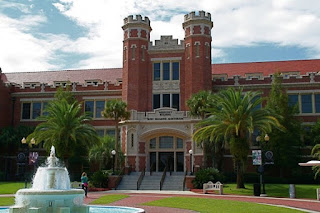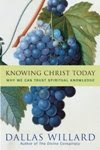As I sat in my classroom at Florida State University during the Fall of 2007, beginning my first New Testament class, I was very confused. I signed up thinking that the class would delve even deeper into the words that had recently begun to transform my life, bringing me even closer to the Jesus I had just encountered. However, I very quickly felt disillusioned; the teacher of the class was speaking about Jesus in very different words than my pastor used. Her words about Christianity sounded very detached, spoken as an outsider looking in.

For some reason, many professors and leaders of academic circles seem to treat Christianity as a quaint system of myths and beliefs that should not be taken seriously by true thinkers. They believe that science and modern thought have shown Christianity to be irrelevant and untrue.
In his newly released book, “Knowing Christ Today: Why We Can Trust Spiritual Knowledge” (HarperOne, hardcover, 256, $24.99), Dallas Willard exposes these views as utterly false. He shines light on the truths and knowledge of Jesus and reveals them as plainly knowable.
Simply stated, Dallas is one of my favorite authors. Months before this book was released, I knew I would immediately devour it. Thankfully, the publisher—HarperOne—sent me an advanced copy to review.
The book, though only 256 pages, is extremely thick with content and is a very intense read. Dallas begins by fairly warning that, “…this is not a devotional book and that it will require considerable mental effort to understand.”
He starts his discussion by stating some truths about the role knowledge plays in today’s Christianity. He explains how our culture tends to treat religious beliefs as something other than—and often less than—firm knowledge. He notes this as a serious explanation for the divide between what Christians profess and how they act. Few people have true knowledge of what they profess to believe on Sundays, and this “blind-faith” is eventually evident in the actions of their lives. Bluntly, since few Christians truly believe what Jesus said and did to be true, their lives understandably show little difference from those of unbelievers.
In a wonderfully accurate articulation of my experience in college, Dallas explains that, “So much effort has been invested by modern and contemporary thinkers in a secular interpretation of religion that religion can now be studied with no reference to God at all…. It is now simply assumed that every field of knowledge or practice is perfectly complete without any reference to God as real and relevant, and all the more so without any knowledge of God and his activities.”
Dallas emphatically states that despite popular modern opinion, “There is a body of uniquely Christian knowledge, available to all who would appropriately seek it, whether Christians or not.” True knowledge of God’s existence, the story of the Gospel, and the working of Jesus today is available for those who honestly seek it.
 Dallas then walks through the reasons why Christianity isn’t generally recognized as the source of true reality and knowledge in the world today. He states, “If it were seriously imagined that the teachings of Christianity or other religions constituted a vital and irreplaceable knowledge of reality, there would be no more talk of the separation of church and state than there is of the separation of chemistry or economics and state.” He points out that the battle pitting science against religion is in fact a false conflict. Science answers certain questions, while religious knowledge taps into deeper truths that are beyond even science. Dallas points out that, “The best physical, chemical, and other scientific knowledge will not tell us what to do and who to be”. To answer the big questions of life, a deeper knowledge is needed—and thankfully is available.
Dallas then walks through the reasons why Christianity isn’t generally recognized as the source of true reality and knowledge in the world today. He states, “If it were seriously imagined that the teachings of Christianity or other religions constituted a vital and irreplaceable knowledge of reality, there would be no more talk of the separation of church and state than there is of the separation of chemistry or economics and state.” He points out that the battle pitting science against religion is in fact a false conflict. Science answers certain questions, while religious knowledge taps into deeper truths that are beyond even science. Dallas points out that, “The best physical, chemical, and other scientific knowledge will not tell us what to do and who to be”. To answer the big questions of life, a deeper knowledge is needed—and thankfully is available.
Dallas then introduces the classical proofs for God’s existence, from the logic of Thomas Aquinas to the mysteries of today’s sciences. He follows this by delving into how the knowledge offered by Jesus affects every field of life today.
At this point I began to be slightly overwhelmed. Dallas, as a Philosophy professor at the University of Southern California, tends to drift towards the philosophical view of things instead of the practical. But he began his next chapter on how the true knowledge of God, as revealed through Jesus, affects the spiritual life. Here Dallas recalls the wisdom of his other books dealing with the spiritual disciplines. He explains that gaining true knowledge of reality—which in turn includes God and his kingdom—naturally leads to the living of a life in line with the character of Jesus.
The final chapter in the book is the one I believe to be the best and most empowering. Titled, “Pastors as Teachers of the Nations”, Dallas challenges all of those who teach, lead, or pastor others to reclaim their historical role as the teachers of knowledge. What was once provided by the teachers of faith has now been monopolized by secular teachers and professors who offer a secularized take on reality and truth.
Dallas also calls us all to embrace our role as witnesses of faith. He adds that, “…witnesses are, first of all, those who know something. They don’t just believe something. If you get on the “witness stand” to tell people what you believe or feel strongly about, it will be of no use….The witness knows something and makes that knowledge available to others.”
As a cure to much insubstantial preaching today, Dallas encourages that, “… pastors must present the fundamental points of basic Christianity as knowledge, and as knowledge that is testable and available to anyone who truly wants to know…Pastors now are mistakenly seen, and perhaps even see themselves, as teaching what Christians are supposed to believe, not what is known and what can be known through fair inquiry.”
To finish the entire discussion, Dallas closes sternly. He pronounces that, “Whatever your situation, there is nothing more important on earth than to dwell in the knowledge of Christ and to bring that knowledge to others.”
I ended the book convinced of the necessity of knowledge. I realized that it is time for the professed disciples of Jesus to dismiss his reputation among intellectuals as, “an airhead who stands haplessly before people with PhDs.” And I finished energized with a passion to seek truth, knowledge, and reality, wherever they are to be found.
This is one of the best books I have read in the past year, and I cannot recommend any better author or book for those who seek to use their whole mind in the pursuit of truth.

